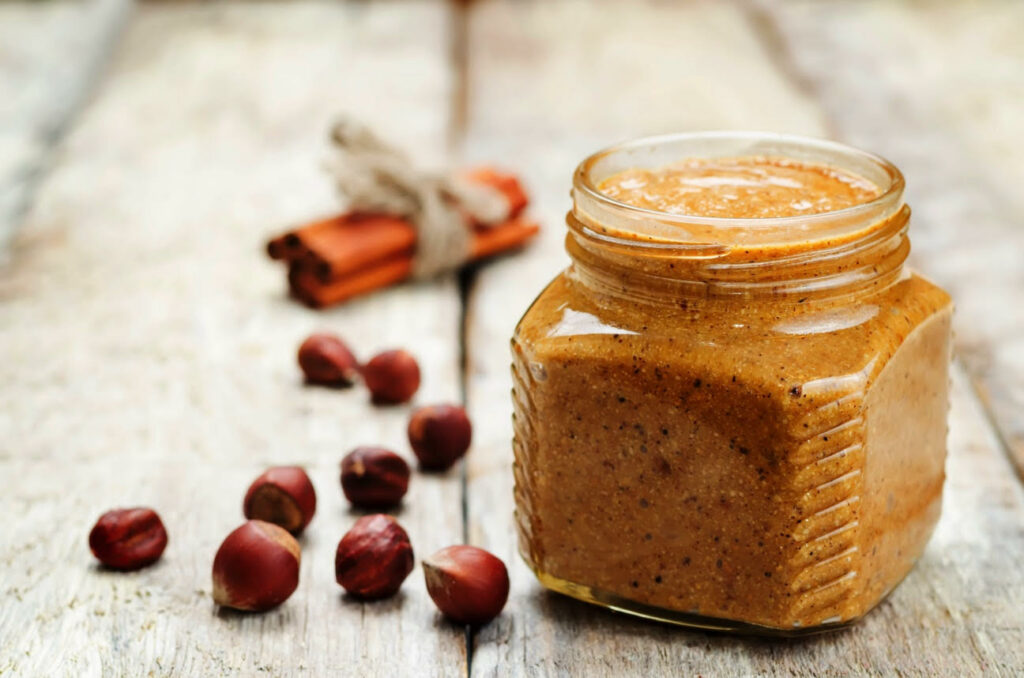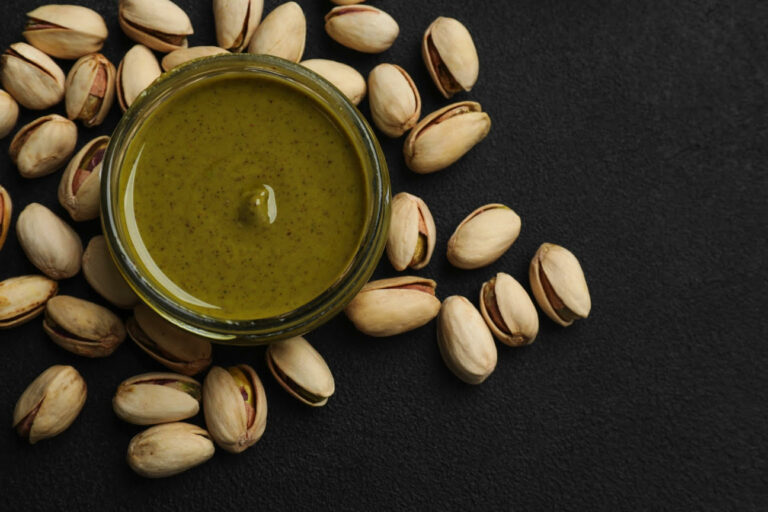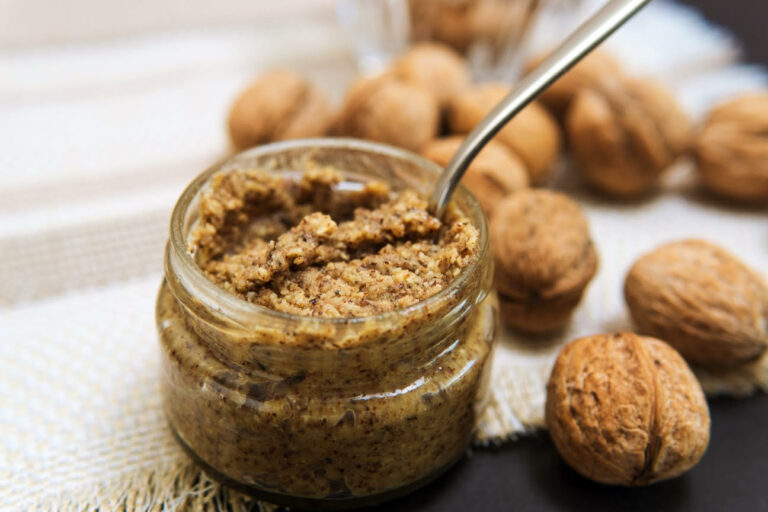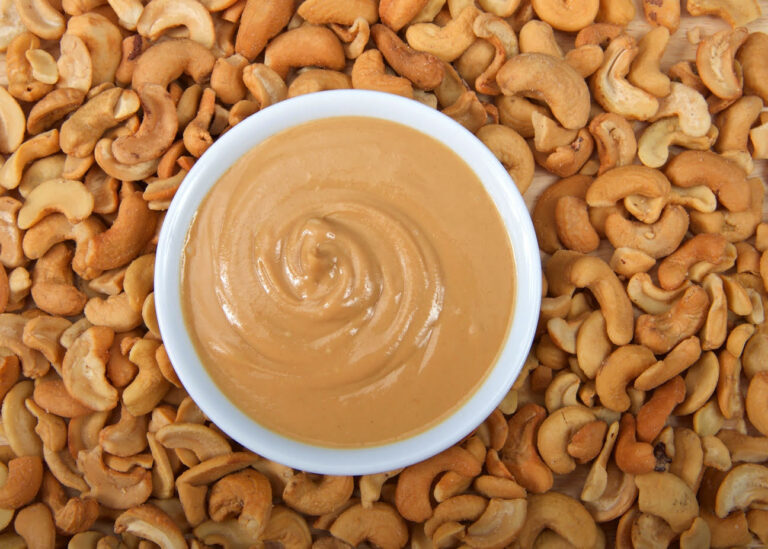
Hazelnut butter, with its rich, creamy texture and distinct nutty flavor, is a type of nut butter that has been capturing the hearts and taste buds of food enthusiasts around the world. Whether spread generously on toast, incorporated into recipes, or simply enjoyed by the spoonful, hazelnut butter offers a delightful culinary experience.
Hazelnut butter vs. Nutella
When people think of a hazelnut spread, they often associate it with the popular chocolaty spread, Nutella. However, hazelnut butter and Nutella are two distinct spreads that feature hazelnuts as primary ingredients, but they have several key differences in terms of ingredients, flavor, texture, and nutritional profiles.
- Ingredients:
- hazelnut butter: typically made from roasted hazelnuts with little to no additional ingredients. It may contain a touch of salt for flavor, but some versions are purely hazelnuts
- Nutella: a hazelnut chocolate spread that includes roasted hazelnuts, sugar, palm oil, cocoa solids, milk powder, lecithin (an emulsifier), and vanillin (an artificial flavor); the presence of sugar and cocoa gives Nutella its signature sweet and chocolaty taste
- Flavor:
- hazelnut butter: has a pure, nutty flavor with a subtle sweetness if any sugar is added; highlights the natural richness and nuttiness of hazelnuts without the overpowering sweetness of chocolate
- Nutella: renowned for its sweet, chocolate-hazelnut flavor; rich, creamy, and has a pronounced sweetness, making it more akin to a dessert spread than a nut butter
- Texture:
- hazelnut butter typically has a thick, creamy texture similar to other nut butters like peanut or almond butter; spreads easily but can be slightly grainy if it’s made from raw hazelnuts
- Nutella: notably smoother and creamier due to the addition of oils, sugar, and milk solids; has a velvety consistency, making it easy to spread
- Nutritional Profile:
- hazelnut butter: a nutritious choice, rich in healthy monounsaturated fats, protein, fiber, vitamins (like vitamin E), and minerals (such as magnesium); offers a source of sustained energy and various health benefits, including heart health and weight management
- Nutella: contains hazelnuts but it’s also high in sugar and unhealthy palm oil; makes it much less nutritious than pure hazelnut butter and is considered more of a sweet treat than a health-conscious choice
- Versatility:
- hazelnut butter: versatile in both sweet and savory applications; great as a spread on toast, in baking, or as an ingredient in salad dressings and sauces
- Nutella: Nutella is primarily used as a sweet spread for breakfast items like bread, pancakes, and waffles; also used as a filling for pastries, crepes, and desserts
Nutritional Profile of hazelnut butter
Before delving into the health benefits of hazelnut butter, let’s start by examining its nutritional composition. Hazelnuts are nutrient powerhouses, and when transformed into butter, they retain many of their valuable properties:
- Healthy Fats: a source of heart-healthy monounsaturated fats, which can help lower bad cholesterol levels and reduce the risk of heart disease
- Protein: contains approximately 3 grams of protein, making it a suitable option for those looking to increase their protein intake
- Fiber: a good source of dietary fiber, which aids in digestive health and helps you feel full and satisfied
- Vitamins and Minerals: provides essential vitamins and minerals such as vitamin E, magnesium, calcium, and potassium, contributing to overall well-being
Health Benefits
Now, let’s explore the impressive health benefits of hazelnut butter:
- Heart Health: monounsaturated fats in hazelnuts may help reduce the risk of cardiovascular diseases; can lower LDL (bad) cholesterol levels while maintaining or increasing HDL (good) cholesterol levels
- Antioxidant Powerhouse: hazelnuts are rich in antioxidants, particularly vitamin E; antioxidants combat oxidative stress in the body, potentially reducing the risk of chronic diseases and supporting skin health
- Weight Management: The combination of healthy fats, fiber, and protein can promote feelings of fullness and help with weight management by curbing overeating
- Bone Health: hazelnuts contain calcium and magnesium, vital for maintaining strong and healthy bones; incorporating it into your diet can contribute to bone density and overall skeletal health
- Reduced Risk of Diabetes: the fiber content can help stabilize blood sugar levels and reduce the risk of developing type 2 diabetes
- Improved Brain Function: The vitamin E in hazelnut butter has been associated with improved cognitive function and reduced risk of cognitive decline.
- Skin and Hair Health: The antioxidants in hazelnuts can promote healthy skin and hair by combatting free radicals that contribute to premature aging.
Incorporating Hazelnut Butter Into Your Diet
Now that we’ve highlighted the health benefits, let’s explore creative ways to incorporate hazelnut butter into your daily diet:
- Spread It: Use hazelnut butter as a delectable alternative to traditional spreads on toast, muffins, or bagels.
- Smoothies: Add a spoonful of hazelnut butter to your morning smoothie for a creamy texture and nutty flavor.
- Baking: Incorporate hazelnut butter into your baked goods like cookies, brownies, or energy bars for a delightful twist.
- Salad Dressings: Create creamy, nutty salad dressings by mixing hazelnut butter with olive oil, vinegar, and your favorite seasonings.
- Savory Dishes: Explore the savory side by using hazelnut butter as a base for sauces or marinades, or drizzle it over roasted vegetables for a nutty boost.
Hazelnut butter is not only a culinary delight but also a nutritional treasure trove. Its impressive health benefits, from heart health to improved brain function and more, make it a versatile and valuable addition to your diet. Whether you’re a food enthusiast, health-conscious individual, or simply looking to diversify your palate, hazelnut butter offers a world of possibilities to explore. So, go ahead, indulge in the rich, nutty goodness of hazelnut butter, and savor the health benefits it brings to your table.











